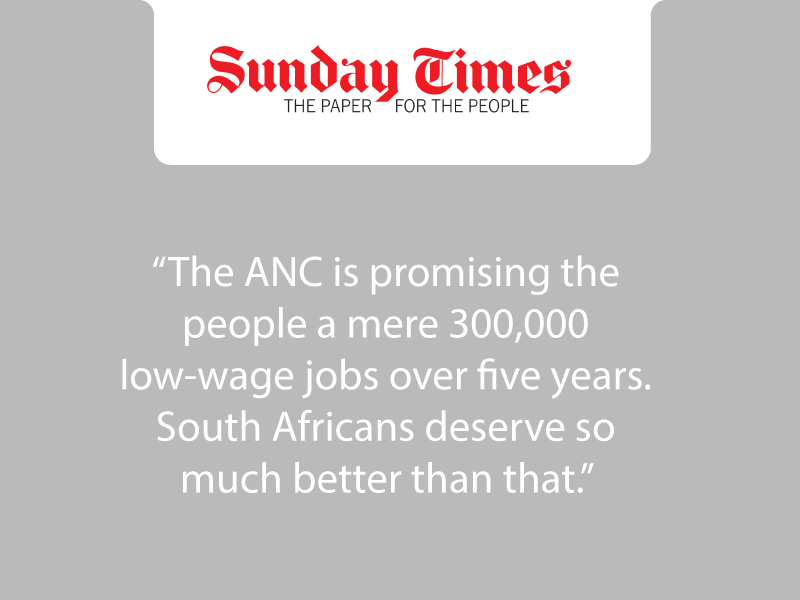
EMILY Mbongwa’s story was told to the New York Times in September last year: “I used to be a domestic worker. My hours were from six in the morning until nine at night. Then I went to work at a garment factory in Newcastle where I was treated with respect, the hours were shorter, the pay was better. I started a small business selling shoes to other workers. I saved money from this job to build my own home.”
A garment worker, she lost her job in 2004. In the next few months she will be joined on the streets by hundreds, possibly thousands, of garment workers in Newcastle. They will lose their jobs as the bargaining council’s inspectors enforce compliance with rising minimum wages in the industry. And add to Newcastle’s unemployment rate of about 60%.
Newcastle has had a garment industry since the 1980s – developed mainly by Taiwanese investors. The firms are in the labour-intensive and highly competitive cut, make and trim business. Instead of SA recognising this industry and doing what it can to preserve and expand these companies, existing regulations and practices are destroying it. No one involved in this destruction has explained where the workers involved will get alternative employment.
Nor do they seem to care.
Newcastle employers are not fat-cat capitalists living well while they pay low wages. Most are struggling to make a go of their business. Some of the newer entrepreneurs live in a room or two at the back of their factory, saving for their children’s education. They know that in Swaziland and Lesotho they could pay even lower wages and argue that pushing their wages up to the minimum agreed by the bargaining council will force many companies to close or relocate outside SA.
Some people talk disparagingly of this kind of job.
This is not what we want for SA they say; we are not Asia. There are two problems with this attitude.
The first is a failure to understand the facts of the Asian success story. Compared with the alternatives on offer, working in a factory for low wages and long hours was often the very best way for these countries to get ahead.
For the vast majority of workers – disproportionately women – urban factories were an opportunity, an escape from back- breaking agricultural labour, a new life away from dominant fathers, brothers, husbands.
Within five to seven years, many workers had moved on from the factory floor. They saved money and started a business, often providing services to other factory workers. Or they went back to rural areas where now they had skills and resources. Or they became clerks or supervisors in one of the many different factories.
Working in a factory had given them a toehold into modernity and new opportunities. Their horizons changed. They wanted more for themselves and their children, especially daughters whom they were determined to educate.
Workers were not condemned to stay forever in the low-wage jobs in which they started. They saved, they learnt skills, they moved on and up. The more factories and industries emerge, the tighter the labour market becomes.
This increases workers’ bargaining power – even in authoritarian China – so their wages rise and working conditions improve. Society prospers and everyone in it grows richer from the wealth and taxes built up from these humble beginnings.
The second problem with the approach that says we don’t want these low-wage conditions in SA is the pretence that there is another way this country can move from mass unemployment and underdevelopment to prosperity and near full employment.
No such alternative exists.
If we aspire to be a more developed country, a richer and more inclusive society how else will we get there? We have to employ the people we have now, not some imaginary population with great education and better skills that we hope to have in some indeterminate future.
Imagine if a politician stood up in the Eastern Cape, Newcastle or Polokwane and said: “Vote for me! I believe in first-world labour regulations which by the way means that the vast majority of you will not get jobs at all. Vote for me!
“I believe in empowering urban and rural women, except I will decide what kind of jobs you can get and that means that most of you will not get any jobs at all.” Of course no one will do that. And especially not in places such as Polokwane where 90% of young women were unemployed even before the current recession.
When people talk of SA needing to become an economy that is high skilled and high tech they should also explain the employment consequences for millions of people who do not have skills.
In the 1990s when our labour legislation was being debated, many experts knew the result would lock millions out of the formal employment market. I challenged one of them to come with me to any township and hold a public meeting about the legislation. I wanted them to say publicly what one expert had told me privately: that the adoption of German-style labour standards would mean the creation of a labour aristocracy in SA and mass unemployment for everyone else.
SA today faces a simple question. Is it better for someone to have a job or to remain unemployed? The country has to make a choice. Do you think it is better to have a relatively small number of people working at increasingly skilled jobs with relatively good pay and the vast majority of young people and a third of the labour force unemployed? Or is it better to have as many people as possible employed in the formal sector? Even if many of those jobs are not well paid and have less than ideal conditions, they offer a first step into the modern economy and the wages, training, discipline, skills and opportunities that flow from that.
Increasingly this is going to be the key fault line in our society. Are we building a country for all its citizens or just those who have skills and experience, who are mainly urban and have jobs?
National interests should trump minority sectional interests. And nowhere is this more important than with respect to the changes required to make SA a more labour-intensive economy. We have to change the risk and incentive structure so that existing employers and new investors are encouraged to employ more people and start new enterprises or expand existing ones.
This will not happen if we continue to have regulations that raise the cost and “hassle factor” of doing business and employing people. This will not happen if we do not debate the consequences of our current legal framework and unpack the national implications of what is happening in Newcastle today.
The minister of finance is right: “With jobs comes dignity. With dignity comes participation. And from participation emerges prosperity for all.”
They will lose their jobs as bargaining council inspectors enforce compliance with rising minimum wages.
- Ann Bernstein is executive director of the Centre for Development and Enterprise, and author of The Case for Business in Developing Economies, Penguin 2010.




